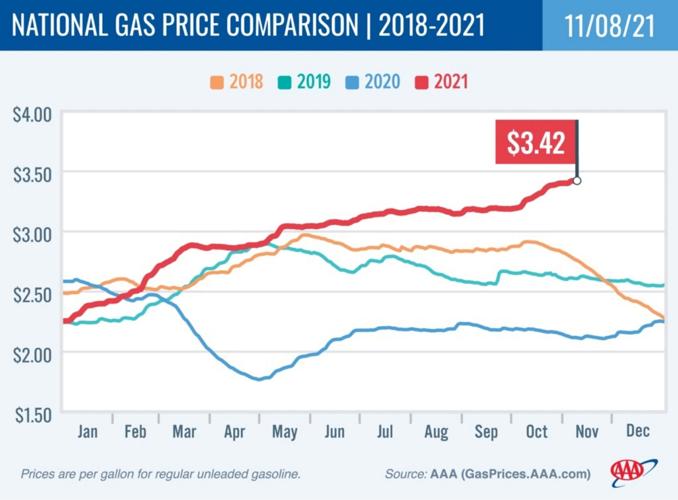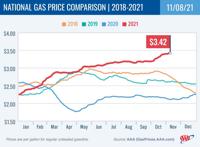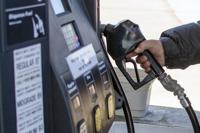U.S. Senate Majority Leader Chuck Schumer and Sen. Kirsten Gillibrand, both D-N.Y., did not join their Democratic colleagues to urge President Joe Biden to take action to lower energy costs, remaining largely silent on potential solutions to address petroleum gas prices hitting seven-year highs.
New York gas prices have increased by more than 42% in the last year with a nearly 25% increase in energy prices, according to a recent report by state Comptroller Thomas DiNapoli.
Gas prices have risen sharply over the past few weeks, with costs suddenly spiking to their highest levels nationally in seven years. Experts warn prices could soar to $5 a gallon.
The average national cost of a gallon of gas hit $3.42 on Wednesday, continuing to rise about 2 cents per week for the last few months, according to the American Automobile Association.
In New York, the average price statewide Thursday was $3.57 per gallon and upstate higher around $3.60 per gallon.
The national average of $3.42 is 16 cents higher than a month ago, $1.31 more than a year ago, and 80 cents higher than in 2019, according to AAA.
U.S. Sens. Chris Murphy and Richard Blumenthal, both D-Conn., and eight other federal Democratic lawmakers representing New England states sent a letter to President Joe Biden, a Democrat, on Oct. 28 to urge his administration to provide financial support and take steps to help lower energy costs for local families.
“Given the significant energy bill increase that many New England families are facing, we respectfully urge the administration to take all appropriate measures to mitigate those costs so that families can be safe in heated homes during the winter season,” according to the letter.
Senators also asked Biden to consider limiting natural gas exports and utilizing stock from the National Strategic Petroleum Reserve.
Schumer and Gillibrand were not part of the letter or effort urging Biden to take action.
“Sen. Schumer believes the admin should look at all available tools to lower costs, such as gas prices, for the American people and that includes possibly tapping into the nation’s strategic petroleum reserve,” Schumer spokeswoman Allison Biasotti said in a statement Friday. “In addition, the just-passed Bipartisan Investment in Infrastructure and Jobs Act will inject billions into the vital projects that can help ease supply chain challenges and put the United States on footing for long-term economic growth and job creation.”
Representatives with Gillibrand’s office did not respond to repeated requests for comment as of press time Thursday why they did not sign on to the letter, their stance on dipping into the national reserve, how they plan to address the historically high gas prices or why they have not called on the president to take action.Alexander Cohen, an assistant professor of political science at Clarkson University, said the state’s leading Democrats may be staying out of the debate on the heels of Republican victories across the state and nation last week with years before they from seeking re-election.
“I can only speculate and can’t think of a firm answer,” Cohen said Thursday. “My guess: Gillibrand and Schumer have relatively safe seats and aren’t worried about reelection, and so they’re looking to back Biden and the establishment as they prepare to get walloped in 2022.”
The U.S. Census Bureau’s monthly retail trade report shows strong year-over-year growth for the third quarter of 2021 — especially in sectors such as gas stations with a 38% increase, a 35% boost in clothing stores and a 34% increase in restaurants and bars.
The Consumer Price Index, which measures the average costs of everyday products, climbed by a staggering 5.4% in one year between September 2020 and September 2021, increasing costs for goods and sales tax collections.
The average consumer had experienced a monthly increase in expenses of $287, with a monthly cost increase of $388 for a family of four, according to the CPI.
State Republican leaders introduced legislation last week to create the Inflation Relief & Consumer Assistance Plan to suspend state sales tax on a wide range of goods and services for two years to provide New Yorkers financial relief amid the ongoing inflation.
“Everywhere you look, costs are going up and people are growing tired of it. Gas prices are the highest in seven years,” Assembly Minority Leader Will Barclay, R-Pulaski, said in a statement about the inflation crisis Nov. 5. “The rate of inflation is reaching levels we haven’t seen in decades. Food, clothing, utilities, transportation – prices are rising on almost everything. How much more are New Yorkers supposed to take. We have a responsibility to act. This bill will give all New Yorkers a measure of financial relief during an extremely difficult time. Fortunately, revenue is coming into New York at a stronger rate than predicted. Let’s pass on some needed savings to people who have fought through a pandemic and are now dealing with a crushing cost-of-living crisis that’s being felt in every community.”
State tax revenue is on the rise year-over-year, according to DiNapoli, but the economic news for consumers is far less positive as cost increases have severely damaged household budgets.
Tara Ricard, the marketing and public relations manager at AAA Hudson Valley in Albany, said Thursday travel has come back with a vengeance compared to last year, and travelers have not communicated concerns about the higher gas prices.
“Our auto travel people haven’t reported anyone balking at it,” she said.
Airport officials dissuaded the agency from holding an event at Albany International Airport this fall because more passengers returned faster than anticipated, she said.
But the elevated gas prices across the state and nation have not discouraged motorists, who may continue to save filling up their tank with increased hours working from home.
“With everyone working from home, gas really isn’t as much of a factor,” Ricard said. “Their transportation costs combined with more working from home have balanced out the cost for leisure travel. Even the people who have gone back to work are going back in a hybrid kind of model, say, two days a week as opposed to five.”
Travelers continue to prioritize regional or domestic trips this year, but international trips are on the rise.
“There’s been an increase in the amount of people utilizing travel insurance ... or using a travel agency in evaluating the nuances of COVID testing and protocols,” Ricard said, adding the travel outlook is hopeful.
“It’s starting to come back,” she said.
Tribune News Service contributed to this report.
*Editor’s note: This story has been updated with an additional quote from U.S. Senate Majority Leader Chuck Schumer, D-N.Y.











